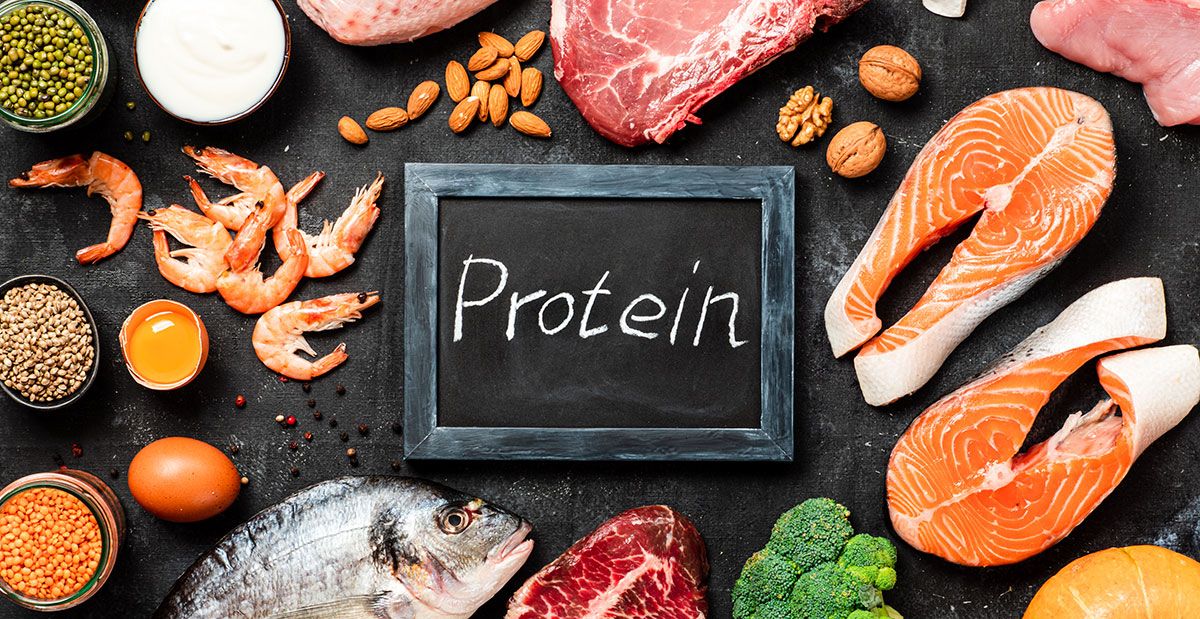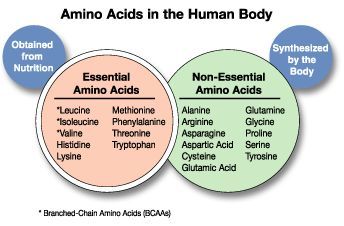Hot Topics
Understanding Protein
In the past there have been multiple warnings about protein-rich diets with suggestions that they may lead to kidney problems, increase the risk of heart disease and even cause cancer - these claims are unfounded. In actual fact having a protein-rich diet can profoundly impact the body in a number of positive and different ways. It can contribute towards reducing blood pressure, enabling weight loss, increasing metabolism, maintaining and building muscle tissue, increasing satiety(fullness), boosting the immune system and enhancing bone health.
Let's firstly consider protein and its function within the body.
It plays vital roles in a number of bodily functions specifically related to maintenance, growth and repair of body tissues and structures, e.g. muscle and bone. Although this is the primary function of the protein, it is also required to produce a number of hormones such as insulin and human growth hormone and can additionally be used as an energy source to the body.
Proteins are large molecules, constructed through combining a number of smaller units known as amino acids. Amino acids make up approx 75% of the human body! When protein is consumed, e.g. meat chicken fish cheese pumpkin seeds, it is broken down into individual amino acids which are then absorbed and used by the body. There are three distinct amino acid groups to be aware of, 1. Essential, 2. Non-Essential and 3. Conditional Amino acids.
There are 9 essential amino acids that must be consumed in one's diet. The reason these Amino acids are considered essential is because the body is unable to synthesise them by its own means. As a result, it is vital that we ingest these essential amino acids on a daily basis. There are 11 non-essential amino acids which can be created by the body and therefore consuming them in our daily diet is of less importance; however, 7 of these are conditional amino acids which are not normally considered essential except during times of stress or illness.
In order to consume an adequate amount of essential amino acids, it is recommended to eat a number of animal-based proteins such as Meat, Eggs, Dairy and fish. These contain all the essential amino acids required to rebuild tissue in the human body. It is therefore extremely challenging for vegetarians and vegans to ingest enough essential amino acids, as foods outside these groups contain amino acids but not all the essential amino acids required to build muscle tissue. The primary focus of the vegan or vegetarian diet should be consuming a wide range of Protein-rich plant-based foods. By having a well-rounded diet that has adequate amounts of protein will ensure that growth and repair within the body are optimised. Every single day our bodies experience a large degree of stress and strain, and therefore there is a need for daily repair Failure to digest an adequate amount of essential amino acids may lead to a number of health issues such as muscle wastage, muscle weakness, bone deterioration anaemia (low blood Iron) and decreased immunity.
When it comes to resistance training, protein influences are even more important. This type of training exposes the body to a stimulus- tears (very small tears) to appear in the individual muscle fibres., (more specifically myofilaments). In order for these micro-tears to be efficiently repaired over the next 4 to 6 days, ample protein is required. Failing to ingest an adequate amount of the essential amino acids after a workout may contribute to a stunted recovery, thus impacting movement, muscular strength, muscular soreness and training capability.
Top protein-rich foods
When it comes to day to day nutrition, we are often tempted to make poor nutrition choices that can interfere with our process, whether its fat loss or muscle density. Life can be stressful at times, so it is typically in these moments that we make wrong choices. To combat this, the following list mentions some protein-rich foods that you should regularly adopt into your daily diet. These foods will not only provide you with adequate servings of protein, but they will also contribute to building a healthier body.
1. Lean cuts of red meat (fillet steak)
Lean cuts of red meat have 20gms approx of protein per 100gms and 10gms of fat. Because of the fat content, we don't want to eat steak too often, However, red meat has a high content of Creatine which is essential for muscular performance and recuperation.
2. Turkey
With approximately 30 grams of protein and 3 gms of fat per 100g serving, turkey is undoubtedly the best meat for delivering protein to the body.
3. Fish
There is a vast array of seafood products that we can consume to help us comfortably meet our protein requirements. 100g servings of tuna (24g), salmon (24g), cod (21g), and mackerel (21g) are all superb, low-fat, high-protein food choices. Consuming fish regularly has also been found to reduce the risk of developing heart disease. This is because fish contains an essential fatty acid known as Omega-3, which has been found to have many positive effects on the body.
4. Cheese
Cheese is another superb protein food which can be added to a number of different meals. There are many different types of cheese with each type containing a different amount of protein; however, most cheese will deliver between 26 – 36 grams of protein per 100g serving. While cheese is excellent for boosting one's protein intake, do be aware that most cheeses tend to be high in calories, fat and salt.
5. Peanut Butter
Peanut butter, and nut butters in general, have grown a reputation for being highly nutritious as well as high in protein (but doesn't contain all the essential amino acids. Nut butters are made by grinding the nuts down into a paste that can then be spread. Peanut butter contains a whopping 25 grams of protein per 100g serving. As with cheese, it is important to recognise that because peanut butter is super high in fat with nearly 50 grams of fat per 100 grams and therefore should be consumed in moderation.
6. Almonds
Close behind peanut butter, we have another nut product – this time in the form of almonds. Almonds are a great snacking option that contains 21 grams of protein per 100g (but not all the essential amino acids), along with a high amount of healthy fats to promote heart health and micronutrients to maintain optimal bodily function. Considering the fact almonds do contain a high amount of fat, it should not come as a surprise to know that almonds are high in calories.
7. Pumpkin Seeds
Seeds, like nuts, tend to be a nutritious, protein-rich food option. 100 grams of pumpkin seeds, will provide 19g of protein( but not all the essential amino acids) for the body. In addition to this, pumpkin seeds contain a vast number of antioxidants which promote immunity and help to fight infection or illness. Seeds can easily be added to a whole host of dishes to boost overall protein content.
8. Edamame Pods
Perhaps not a food that you expected to see on the list, edamame pods contain approximately 12 grams of protein per 100g serving. If you haven't heard of edamame pods before, they are simply unripened soya beans that contain all essential amino acids required by the body. This makes edamame pods, not just useful for vegans and vegetarians, but everyone.
9. Greek Yoghurt
In the process of producing greek yoghurt, whey is removed, which causes the yoghurt to become a lot thicker, creamier and a little more sour. This makes greek yoghurt an excellent food product that can be added to a variety of dishes. There are a number of greek yoghurt products available, and therefore you can expect to gain between 10 – 20 grams of protein per 100g serving. Look to avoid flavoured greek yoghurt products as the majority of them have sugar added, are higher in calories and may be lower in protein.
10. Cottage Cheese
For a number of years, cottage cheese has been a staple part of the athletes' diets. This is due to its high protein and low carb content. It is produced by draining the cheese instead of pressing it (as with other cheese products) before adding cream to create cottage cheese. Cottage cheese contains 11 grams of protein per 100g and, unlike other cheeses which are typically high in calories, it only contains 98 calories per 100g.
11. Boiled Eggs
One boiled egg contains 6 grams of protein and a multitude of important vitamins and minerals which are essential for maintaining proper bodily function. As with high protein diets, eggs have also unjustly received a negative reputation for apparently increasing cholesterol levels in the body, thus elevating the risk of developing heart disease. While eggs do indeed contain a large amount of cholesterol, it is "good" cholesterol (known as HDL's) which actually lowers the risk of developing heart disease.
12. Tofu
Tofu is an excellent food choice for everyone, not just vegans and vegetarians. Tofu comes from curdling soya milk (a process similar to making cheese) and contains 8 grams of plant-based protein per 100g. One of the benefits of tofu is that it is very versatile and can practically be added to any dish to provide a powerful protein boost.
Supplements:
The last few items on the list are supplements which can certainly prove to be convenient and drive up your daily protein intake. However, don't forget that these products are known as supplements for a good reason. Simply, they supplement your overall nutrition and should not be over-relied on to fulfil macronutrient requirements. If you judge that you consume enough protein per day through your diet, there is no reason to begin taking protein supplements.
13. Protein Shakes
Protein shakes are quick, easy and practical. They do provide you with a quick protein boost, and little preparation is required to prepare a shake. Protein shakes would certainly be recommended to a number of specific individuals. For example, individuals looking to build muscle will require a high daily protein and calorie intake in order to drive muscular growth. By taking a protein shake supplement, they will make their calorie and protein target more manageable.
There are so many different brands, flavours and types of protein shake available that it can almost make it impossible to choose. Always check the nutritional information to make sure that there is a high amount of protein with each shake. Secondly, check the sugar and overall calorie content of the protein shake as many shakes do contain a high number of both.
Final Word
Regardless of your goal, maintaining protein levels on a daily basis should be high on your priority list. The amount of protein you consume per day depends on a number of factors; however, the general recommendation is to aim for approximately 0.8 grams of protein per kilogram of bodyweight. However, if you are looking to build or maintain muscle mass, the recommendation is to consume a higher amount; between 1.0 – 1.6 grams of protein per kilogram of bodyweight. By utilising a number of the products in the above list, you will quickly find that hitting your daily protein target is more manageable than you imagined.
New You Personal Training Dublin, Weight Loss Dublin. No Products. No fad diets. Turn your metabolism from fat storing to fat burning so you can increase lean muscle tissue and burn body fat.
Visit Us: 63 Lower Baggot Street, Dublin 2
Call: +353 1 644 9470 or +353 1 644 9530
Email: info@newyou.ie
New You is a luxurious 5000sq ft dedicated one to one personal training weight management, medical and rehabilitation clinic.
Copyright ©2024 New You
Designed by Aeronstudio™















